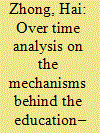| Srl | Item |
| 1 |
ID:
136261


|
|
|
|
|
| Summary/Abstract |
A major challenge to the empirical studies on the effect of sibling size on children's health is the endogeneity of family size. The radical one-child policy implemented in 1979 in China provides us with a unique opportunity to apply a regression discontinuity design method to examine this issue, which requires much weaker assumptions than the IV approaches used in previous studies. Our results indicate that although there are statistically significant associations between sibling size and children's health, there is no evidence for the quantity–quality trade-off.
|
|
|
|
|
|
|
|
|
|
|
|
|
|
|
|
| 2 |
ID:
149761


|
|
|
|
|
| Summary/Abstract |
In this paper, we exploit the negative educational shock caused by the Chinese Cultural Revolution to apply a regression discontinuity method in identifying the causal effects of education on health. While we find that better education reduces the probability of having poor self-assessed health and disabilities, we do not find statistically significant effects of education on the probability of having poor physical functioning status or uncomfortable body pains in the previous four weeks. Moreover, we find an interesting result that better education increases the probability of having chronic diseases. While most existing studies only identify the effect of education at a particular level, one contribution of our paper is that it provides estimates much closer to the population average effect. Moreover, our results imply that the underlying mechanism behind the effect of education on health might be different in developing countries from that in developed countries.
|
|
|
|
|
|
|
|
|
|
|
|
|
|
|
|
| 3 |
ID:
103912


|
|
|
|
|
| Publication |
2011.
|
| Summary/Abstract |
Population aging is an emerging issue in developing countries. In this paper, we argue that it is largely responsible for the sharp increase in income inequality in rural China at the beginning of this decade. As a result of the one-child policy implemented in 1979, fewer young adults have reached working age during this period. This leads to a fall in the ratio of household members in working age. Regression-based inequality decomposition shows that labor shortages and the expansion of industrialization significantly increases the return of a higher ratio of household members in working age to household income while the distribution of this ratio becomes increasingly unequal. The interaction of two effects significantly increased income inequality in rural China.
|
|
|
|
|
|
|
|
|
|
|
|
|
|
|
|
| 4 |
ID:
143414


|
|
|
|
|
| Summary/Abstract |
In this paper, we examine the over time changes in the relationship between education and health in the past two decades in China. We do not find a clear education–health gradient in the early 1990s. However, the education–health gradient emerges and steadily grows. We test a number of different theories that may explain the observed trend. We show that the mechanisms behind the education–health gradient in developing countries might be different from those in developed countries, and heterogeneous across health measures, both of which may have some important policy implications.
|
|
|
|
|
|
|
|
|
|
|
|
|
|
|
|
| 5 |
ID:
103936


|
|
|
|
|
| Publication |
2011.
|
| Summary/Abstract |
When there is substantial variation in the quality of colleges and universities, estimating returns to higher education based on quantity of education alone can be misleading. This paper examines the relationship between returns to higher education and college quality in China. We find that returns to higher education vary significantly depending on school quality. In addition, we find that the relationship between earnings and school quality is stronger for cohorts of workers that have entered the workforce more recently. This finding may result from the fact that as the transition toward a market system progresses in China, the wage system becomes increasingly responsive to key components of human capital. We also find that the earning gap between graduates from lower-quality colleges and those from vocational/technical schools decreases over time. Our results may help to inform individual decision-making on investment in education, effective expansion of the higher education system, and efficient resource allocation across different levels of the education system.
|
|
|
|
|
|
|
|
|
|
|
|
|
|
|
|